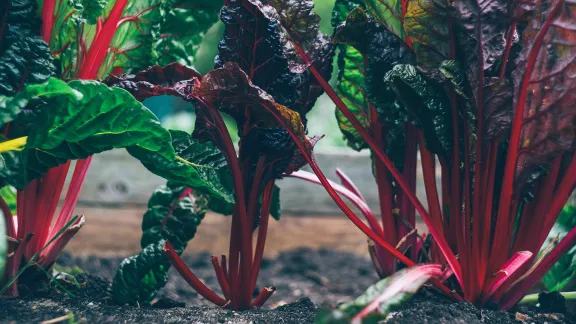
Chard is one of the vegetables grown in the community gardens established during the youth climate project of the Evangelical Lutheran Church in Chile (IELCH). Photo: Markus Spiske via Unsplash
Youth engage in education, community gardening, and reforestation project
(LWI) – “The ‘Seeds of Hope’ project has given me the hope that we, as human beings, can change our attitudes and actions and transform our relationship with the environment and the earth,” said Izani Bruch, Bishop of the Evangelical Lutheran Church in Chile (IELCH). The church’s climate project involved about 80 children, youth and adults.
“Through the project, the young people have contributed to creating awareness in the church membership of the seriousness of the climate crisis and the urgent need for us to have a metanoia, a radical change of attitude, towards the environment,” Bruch said. “They succeeded in initiating a process of sensitization and awareness in our church: every one of us has to take responsibility and care for creation.”
“The greatest challenge in our country is the need for a drastic cultural change,” added Pablo Ríos, project coordinator for “Seeds of Hope”. “Education is a way to increase citizens’ awareness of the deep crisis we are in.” At the same time, the project helped to recognize “the wonderful link with nature, the respect it requires and the need to adapt to the changing climate.”
Ríos pointed out that young people are at the forefront of this challenge, setting an example for other generations. “They value science, but also the spiritual and respectful connection with creation.”
“Seeds of Hope” had three parts – creating five community gardens, reforestation of the church’s retreat camp with indigenous plants, and education on environment care, waste management and recycling. It took place from July to October 2021, and was supported by The Lutheran World Federation (LWF).
Community gardens for healthy food
As the climate changes, communities are challenged to grow food “that allows us to satisfy our needs, but not at the expense of the environment,” Ríos explained. “Seeds of Hope” promoted cultivating vegetables, fruits, and medicinal herbs in community gardens and included compost making and biological pest control.
According to Ríos, a space of about ninety square meters catered for germinating, growing, and harvesting “a good amount of products.” Crop rotation, diversity, and natural repellency were essential to avoid pests. In this way, the project participants could successfully grow peppers, carrots, lettuce and other vegetables, and herbs such as basil and parsley.

Herbs and vegetables harvested from the community gardens. Photo: IELCH
In addition, community gardening promoted mental health, Ríos said. “There is the exercise of care, the satisfaction that comes from eating own produce, and the awareness of how healthy and wholesome it is to grow food on a small scale, without pesticides or agro toxins.” He is convinced that personal and community commitment to “small actions can change our world.”
Upgrading retreat site with indigenous plants
Another focus point of “Seeds of Hope” was the church’s retreat center El Tabito. On the site, there is a slope that was “not in good condition,” explained Ríos. “There were exotic pines that dry out the soil, acidify it, and because they are not native to this region, nothing grew underneath.”
With the help of botanical experts of the central coastal area of Chile where El Tabito is located, the participants of “Seeds of Hope” identified about 15 different species and planted about 70 plants, shrubs, and trees native to the region. “Such vegetation can recover arid soils and resist the dry summer season,” Ríos said.

With a lot of intergenerational engagement, the reforestation of the slope at the IELCH retreat center El Tabito takes shape. Photo: IELCH
To reestablish the soil’s fertility, the group dug deep holes, filled them with compost and earthworm humus, and began planting the new vegetation. Finally, they repaired a well, installed a pond, and set up a drip irrigation system to establish the new plants. “We are happy because to date we have not registered any losses in the plantation, having a 100 percent yield in the reforestation work,” Ríos proudly reported.
Looking at the achievements of “Seeds of Hope” so far, Ríos appreciated this “way to meet again the land, biodiversity and different voices that deserve to be heard in the various communities.” He stressed the ongoing importance of strengthening sustainability in communities and the awareness of the “beautiful natural processes and cycles that can be seen in each plant and the entire creation.”
By LWF/A. Weyermüller


